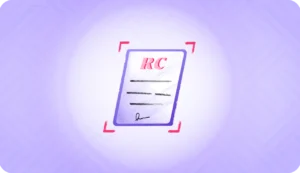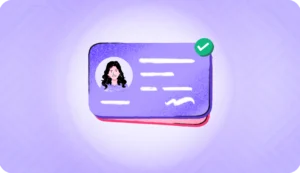What is RC verification?
A document that proves a vehicle has been registered with the local road transport authority is known as RC (Registration Certificate). The process of verifying the authenticity and validity of an RC is called RC verification.
RC verification helps the buyer specify whether the vehicle has been registered with the authorities. It also gives information on any debts or liabilities with the vehicle. This information ensures that the customer is not buying into any legal or financial issues related to the vehicle.
How is RC verification done?
- Submitting an application: The first step is to submit an application form for RC verification. This can be done online by various platforms such as HyperVerge or in person at the local government office.
- Verification: Once the application form has been submitted, the authorities verify the information and supporting documents provided. They may also perform an on-site inspection of the individual’s residence to verify their address.
- Approval: If the provided information and documents are accurate and complete, the authorities will approve the RC verification procedure and issue a certificate of residence as the third step.
- Issuance: Generally, the RC certificate is issued within a few days of approval and can be collected by the individual in person or delivered by mail.
Documents required
Proof of Identity: A passport, aadhar card, driving license, PAN card, etc.
Proof of Residence: A utility bill, rental agreement, bank statement, etc.
The requirements for the RC verification process may vary depending on the country and state, so it is essential to check with the local authorities for specific requirements.
How does VAHAN enable RC verification?
VAHAN (Vehicle Registration and Authentication) is a central electronic database software of the Ministry of Road Transport and Highways (MoRTH) in India. It allows real-time access to information about registered vehicles in India for the RC verification process.
VAHAN is designed for all vehicle-related information, such as details of the vehicle’s owner, its make and model, the engine number, and the RC. It provides a secure platform for verifying the authenticity of RCs.
RC verification for BFSI industry
RC verification plays a crucial role in the banking, financial services, and insurance (BFSI) industry. The main goal of RC verification in the BFSI industry is to prevent illegal financial activities. The BFSI industry performs the below steps for RC verification:
Online verification
It includes using online data and publicly available information to specify the customer’s address. This can be done by checking Google Maps, the electoral roll, and other government websites.
Physical verification
This process involves sending a verification agent to the customer’s address to verify the authenticity of the address. It is done for high-value transactions or customers who do not have an online existence.
Data analytics
Data analytics is used to determine any discrepancies in the customer’s information. This process can be done by analyzing the customer’s transaction history, location, etc., which may indicate fraudulent activities.
Benefits and drawbacks
The main benefits of RC verification include the following:
- Improve security: RC verification improves security and reduces the risk of fraudulent activities such as money laundering, identity theft, etc.
- Compliance with regulations: Various regulatory bodies, such as the Reserve Bank of India (RBI), demand RC verification to prevent financial crimes. By performing RC verification, financial institutions can comply with these regulations and avoid fines.
- Improved customer experience: It ensures that customers are getting their services and products quickly and more efficiently, as the verification process confirms the address and identity of a customer.
- Other benefits: The other benefits include better risk management, increased trust, improved data quality, etc.
Here are some of the drawbacks:
- Limited validity: RCs are issued for a fixed time and have to be renewed, which can be a hassle for the vehicle owner.
- Legal requirements: RC is a legal document that can result in penalties and fines if an individual fails to renew or maintain it properly.
- Inadequate information: If the provided information in the RC is not up-to-date or complete, it can lead to problems in the case of an accident or a dispute.
How can HyperVerge help?
RC verification is essential while buying a used vehicle because it specifies its authenticity and legality and helps make an informed decision.
In-person RC verification is a very time-consuming process. However, online RC verification is the easier and better option. Online platforms such as HyperVerge provide RC verification at a minimum price and in less time.
Visit HyperVerge and save money by verifying RC at a minimum price.
FAQs
1. Can I verify the RC of a second-hand vehicle before purchasing it?
Yes, you can easily verify the RC details of a second-hand vehicle before purchasing it.
2. What if a person’s RC is lost or damaged?
In case of a lost or damaged RC, a person can apply for a duplicate RC by submitting a written application to the concerned RTO along with the required supporting documents and a fee.
3. How long is RC valid in India?
According to the Central Motor Vehicle Rules, all vehicles must re-register every five years after 15 years.




